 Along with working out and staying active, it is important to take good care of what we eat before and after a workout for energy and tissue repair respectively. Primarily, the go-to in this case is protein but do you get your protein from protein supplements or from natural sources? Which works better? Let’s find out!
Along with working out and staying active, it is important to take good care of what we eat before and after a workout for energy and tissue repair respectively. Primarily, the go-to in this case is protein but do you get your protein from protein supplements or from natural sources? Which works better? Let’s find out!
What’s The Difference Between Natural Protein and Protein Supplements?
You can get energy from natural sources as well as protein supplements. Normally, natural foods like fruits, nuts, eggs, chicken, pulses and cereals contain carbohydrates, proteins and good fats which help us get energy for a workout. They also repair tissues. Supplements on the other hand contain amino acids, B vitamins, caffeine, creatine and artificial sweeteners – quality differs from brand to brand.
Who Needs Supplements?
Normally, protein supplements are required for those who perform heavy workouts like athletes, wrestlers and bodybuilders. When the protein requirement is not fulfilled by natural sources, then supplementation is required. Even the amount of protein requirement depends on the person and whether they want to lose or gain weight.
On the other hand, the amount of protein consumed should also be monitored because if it is not used up during the workout, it gets stored in the body as extra calories as 1g protein contains 4 kcal. The ideal protein consumption should be 1.2 to 1.7g per kilogram of body weight or 0.5 – 0.8g per pound of body weight.
There are 3 forms of protein:
- Protein Isolates: This consists of only protein (90-95%) and has carbs and fat removed from it through processing. This is mainly made up of whey protein.
- Protein Concentrate: is the combination of carbohydrate and fat (20-40%) and protein (20-40%). This is mainly made up of plant sources.
- Protein Hydrolysates: This is further processed and breaks the protein into amino acids which makes it more easily absorbed in the body. But it has a big disadvantage – it increases the insulin level of blood mainly which is made from whey protein.
There are many forms of protein supplements available in the market which are derived from various other sources. Comparing the above, try avoiding plant sources as they don’t provide sufficient protein for muscle growth. Whey is easily absorbed and digested whereas casein takes time to get digested but it’s good to consume before sleep as it helps in recovery of muscles and egg protein is another good option as it is easily absorbed by the body.
Taking all of this into consideration, I would like to say that though it has several benefits, protein supplements also have major demerits such as the caffeine and creatine contents which affects blood pressure, creating cardiac issues by increasing heart rate, causing diarrhoea, a disturbed sleep cycle and gut intolerances, etc.
Do note that most of these “health drinks” aren’t regulated by the FDA for safety purposes. So, before you pick a protein supplement, read the ingredients on the label and pick one that fits your requirement. Honestly, what I feel is that it is best to fulfil the protein requirement through natural foods!
We hope this article helps you make a choice! Do let us know your thoughts in the comments below! For more articles on protein, check out Healthy Reads or speak to an expert by subscribing for Personalised Health Coaching here.
#BeTheForce
Disclaimer: The information provided in this blog is for general awareness and educational purposes only. It is not intended to replace professional medical advice, diagnosis, or treatment. Always consult a qualified healthcare provider for personalised medical guidance or concerns related to your health.




Leave a Reply